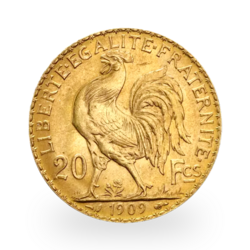Gold has suffered a sharp pullback over the past couple weeks, stoking much bearish sentiment. While a variety of factors fed this selloff, the precipitating catalyst was a gold-futures shorting attack. These are relatively-rare episodes of extreme selling specifically timed and executed to manipulate gold prices lower rapidly. Traders need to understand these events, which are inherently self-limiting and soon bullish.
Gold-futures shorting attacks are very real, with telltale volume and price signatures unlike anything else. I’ve studied them for many years now, and have written extensively about them in our newsletters as they occur. But it’s critical to realize these rare events are only responsible for a tiny fraction of all gold selling. The vast majority of the time gold selloffs are driven by other far-more-normal factors, not shorting attacks.
These isolated anomalous episodes are often cited as proof the gold price is actively manipulated. But whether that’s true or not, gold-futures shorting attacks can only explain tiny sporadic swaths of gold-price behavior. When they occur their impacts can definitely be outsized, but these are always short-lived. That’s because the huge selling necessary to execute a shorting attack is far too extreme to be sustained.
Gold-futures shorting attacks are naturally a subset of gold-futures trading, which dominates short-term gold prices. Gold-futures speculators enjoy a wildly-disproportional impact on gold levels for a couple of key reasons. The American-gold-futures-derived gold price is the world’s reference price. So whatever the futures speculators as a herd are doing greatly affects popular psychology among gold traders globally.
Speculators’ gold-futures trading is a sentiment multiplier. When these guys are buying and driving up gold, other traders grow bullish and start committing their own capital. This virtuous circle feeds on itself. But when speculators are selling gold futures and pushing gold lower, the rest of the traders get nervous and bearish. So they tend to join in the selling, exacerbating the downside. Traders key off gold-futures action.
On top of this, gold futures inherently enjoy extreme leverage to gold which greatly amplifies their impact on its price. Each gold-futures contract controls 100 troy ounces of gold. At $1250, that’s worth $125,000 in notional terms. But the margin required to trade a gold-futures contract is merely $4200. So a speculator running minimum margin can employ extreme leverage nearing 30x! The legal limit in the stock markets is 2x.
Compared to normal gold investors buying outright at 1x leverage, every dollar of capital bet by futures speculators can have 20x to 30x the gold-price impact! So even though gold investment dwarfs gold-futures trading, on a short-term basis the latter is like the tail that wags the gold-price dog. This extreme leverage inherent in gold futures is the only reason shorting attacks using them are even possible in the first place.
The mechanics of a gold-futures shorting attack are simple. A large speculator or group of them short sells gold-futures contracts at dizzying rates only sustainable for minutes on the outside.That’s far too much selling pressure for gold futures to absorb, radically beyond normal trading tempos. The resulting extreme sell-side imbalance forces gold prices to plunge before enough buyers emerge to absorb that selling.
The speculators executing these attacks hope they spawn widespread gold-futures selling. Because of gold futures’ extreme leverage, traders can’t afford to be wrong for long. At 25x, a mere 4% gold-price move against a position results in a 100% loss of capital risked! So the short sellers hope their selling blitzes will force opposing long-side speculators to capitulate and sell, usually via mechanical stop-loss orders.
This additional selling of gold-futures long contracts drives its price even lower, tripping more stop losses already in place. Then with gold sharply lower, the speculators who launched the shorting attack start to gradually buy gold futures to cover and close their positions. Buying back at lower gold prices than they sold at leads to profits. This whole process is very fast, measured in minutes for shorting and hours for covering.
Gold-futures shorting attacks are easy to identify because the trading volumes are so extreme. Every week, the Commodity Futures Trading Commission details speculators’ total long and short gold-futures positions in its famous Commitments of Traders reports. A big swing in total spec longs or shorts in any entire week is 20k+ gold-futures contracts. Gold-futures shorting attacks dump 20k+ contracts in minutes!
This chart looks at speculators’ total gold-futures long and short contracts since 2015, in green and red respectively. Gold itself is superimposed in blue. It’s incredible how much speculators’ collective gold-futures trading dominates short-term gold price action. I’ve written a bunch of essays on this, the most-recent in late February. Gold price action cannot be understood and gamed without following gold futures.

Just a few weeks ago as gold challenged $1290, a series of gold-futures shorting attacks were unleashed in rapid succession. They quickly turned gold south, nullifying its recent bullish breakout above its 200-day moving average. In order to better grasp what just happened to gold, and why it is actually quite bullish, a major past gold-futures shorting attack offers illumination. The most successful came in July 2015.
During that lazy summer a couple years ago, gold was relatively low but stable. It had spent months meandering between roughly $1175 and $1200, with range outliers near $1150 and $1225. Then on Friday July 17th, some gold news hit. Continuously since April 2009, the Chinese government had claimed it hadn’t bought any gold to add to its central bank’s reserves. Few in the gold world believed that was true.
That day out of the blue, the People’s Bank of China declared its gold reserves were 1658 metric tons. It was a 57% jump from the previously-reported number, and likely still fake and wildly-understated. But it was far behind analysts’ estimates that the PBoC really held 3500t+ of gold. So gold slumped 1.0% that day to $1134, below the lower end of its summer trading range. Naturally sentiment was pretty bearish.
With gold on the verge of a technical breakdown, some large speculator decided to launch a gold-futures shorting attack to hasten the process. The execution of this was particularly Machiavellian, coming late on a Sunday nightwhen gold-futures trading volume was exceptionally low. While the great majority of gold-futures trading occurs during American market hours, electronic trading is actually open 23 hours a day.
So the US Monday trading day effectively really starts on Sunday evening at 6pm NYT. That happens to be well before the Asian markets even open, so anomalous gold trading action then can only come from the extended US session. That Sunday night July 19th when no one was paying attention, some large trader slammed through 24k contracts of gold-futures sell orders within just over a single minute! It was crazy.
That volume spike was so extreme that twice within that single minute separate 20-second trading halts were triggered! So the effective dump time of this massive slug of contracts was actually seconds. The gold price plummeted $48 lower to $1086 in that one minute! That was a dismal new 5.3-year secular low for gold, so it was devastating for sentiment. I wrote much more detail on this event soon after it happened.
Inarguably the only reason to sell 20k+ gold-futures contracts within minutes is to brazenly attempt to manipulate gold’s price lower. Long-side speculators who want to exit positions never sell so fast, since it blasts gold lower wrecking their exit prices. And the same is true for normal short-side speculators. If they expect gold to drop and want to establish shorts, they execute their selling gradually for the best entries.
Long-side and short-side speculators alike want to sell gold futures at the highest gold price possible. So they don’t sabotage their own exits and entries by unleashing far more selling than the market can bear. Normal rational speculators enter and exit large positions relative to market volume gradually, over hours. A 20k-contract buy or sell order broken into pieces and spread across hours will have a far-smaller price impact.
That Sunday-night extreme selling blitz in July 2015 was specifically timed and executed to manipulate the gold price sharply lower. And it succeeded with flying colors! But it wasn’t bearish for gold for long. That $1086 gold low hit the second that extreme short selling ended was about as low as gold got. The silver lining of gold-futures shorting is all those contracts must soon be repurchased to close those positions.
Short selling is effectively borrowing gold futures a speculator doesn’t own to sell them, in the hopes of buying them back later at lower gold prices to repay those debts. So every single contract sold short has to be closed by buying an offsetting long contract. 20k contracts of gold-futures short selling guarantees 20k contracts of long buying is coming in the near future. Thus gold-futures shorting attacks are self-limiting.
Since that short covering after an attack comes gradually, it isn’t evident in trading volume like the initial extreme shorting. There’s no way to know when the offending speculators covered. But gold only drifted modestly lower over the next several weeks or so. The Monday after that Sunday-night shorting attack, gold closed near $1098. At worst in early August, gold fell to $1084 on close. And then it started to rally.
Gold-futures shorting attacks are designed to manipulate herd psychology to unleash cascading selling. But that primarily only works on other hyper-leveraged futures speculators. Gold’s investors don’t use leverage, so a few-percent price drop for them is a proportional minor loss. Thus shorting attacks usually don’t spook them into selling. It’s only gold-futures speculators that are forced out, and that process is fast.
After that July 2015 shorting attack, gold bottomed just 4.4% lower than pre-attack levels less than three weeks later. By that point selling was exhausted, all traders susceptible to being scared into selling low had already sold. That left only buyers, so gold gradually powered 9.6% higher to $1188 over the next 10 weeks or so! Gold-futures shorting attacks effectively suck in all near-term selling, clearing it out of the way.
That July 2015 Sunday-night event was the most-successful example of a gold-futures shorting attack in recent years. While it wreaked real damage on gold technicals and sentiment, that was short-lived. The 24k contracts dumped in a minute had to be covered with offsetting long buying, and the resulting bearish sentiment soon led to selling exhaustion. So gold rallied strongly out of that manipulative shorting episode.
With this background, fast forward to April 2017 a couple weeks ago. By mid-month, gold was doing really well. It had surged 7.4% higher in just over 4 weeks since the Fed’s third rate hike of this new cycle which had been irrationally expected to be super-bearish for gold. Then some large speculator or group of them started probing gold’s downside on Tuesday April 18th with the initial gold-futures shorting attack.
It happened just before 10am NYT that day, which is when the new iteration of the anachronistic London Gold Fix afternoon price auction happens. It’s now called the LBMA Gold price auction, and it shouldn’t even exist in this modern world of continuous price discovery. The precise timing of the London Gold Fix makes it very susceptible to manipulation, as many academic studies and even lawsuits have extensively proven.
Large traders with business contracts tied to that gold fix can attempt to bully the gold price around just before its auction. And they do, with an overwhelming downside bias. That day just before the new LBMA Gold price auction someone dumped 22k+ gold-futures contracts within minutes. But gold hardly bent under that heavy pressure, merely sliding from $1286 to $1279. It then surged to close up 0.4% at $1289!
That initial gold-futures shorting attack certainly stood out. It had the telltale volume and price signature of such an event, but failed miserably. That was very bullish that the gold-futures market could absorb so much selling so fast without plunging. It looked like an isolated attack until the very next day, when again just before the current version of the London Gold Fix an even more extreme shorting attack was executed.
On Wednesday April 19th just before 10am NYT again, someone slammed through a 25k-contract gold-futures sell order in a single minute! The intensity of gold-futures shorting attacks is defined by both the total contracts sold and the compressed time span they’re dumped in. That attack was actually slightly bigger and shorter than that July 2015 one, and thus more intense. But its impact was really muted.
Gold plunged from $1286 to $1275 within minutes, and then rallied back to a -0.7% close at $1280. If it had happened on a Sunday night, its downside gold-price impact would’ve been far greater. Any gold-futures shorting attack is pretty rare, so two in back-to-back trading days was highly suspicious. A large speculator was actively trying to manipulate the gold price lower in a big and brazen way, out in the open.
That was leading into April’s third Friday, which is options expiration. And that was after gold had surged sharply in the month following the Fed’s latest rate hike in mid-March, which was universally assumed to be very bearish for gold. So I wondered if some large trader, like a hedge fund, was facing big losses on gold futures or options. Maybe that trader feared gold cresting $1300 would unleash universal new buying.
Whatever the motivation for those attacks, gold proved remarkably resilient through them. That Thursday and Friday saw no more abnormal selling leading into the 10am NYT LBMA Gold price auctions. So it looked like we were out of the woods. France had the first round of its presidential election that Sunday the 23rd, which played out exactly as expected by pollsters and traders. The winners didn’t surprise markets.
The worst-case scenario which didn’t happen was the popular far-right candidate along with an openly-Communist far-left one winning the two top spots for this weekend’s second-round runoff. They both openly oppose the euro and European Union. But the first-round winner who is expected to dominate the final-round vote this weekend is a moderate, very pro-Europe. So there was no adverse France surprise!
Yet that very Sunday evening at 6pm NYT as the electronic American gold-futures session opened, a massive sell order slammed the markets. This was well before Asian markets even opened, so it was definitely US gold-futures trading. With volume so low on Sunday evening, gold plunged from the $1284 it had closed near the Friday before to $1265. That third gold-futures shorting attack was finally successful.
It was the same modus operandi as that July 2015 masterpiece, a Sunday-evening blitz to unleash stop-loss selling among other long-side speculators. And though gold only fell $19 in minutes compared to $48 in July 2015, enough sentiment damage was done. That sparked the gold selloff that has continued and accelerated right into this week. Selling begets selling, and the catalyzing event was that shorting attack.
Remember gold-futures shorting attacks are exceedingly extreme and fast, 20k+ contracts dumped in a matter of minutes on the outside. As gold bounced sharply back up to $1276 within hours after that latest shorting attack, those dumped contracts were likely already covered by then. Indeed that week’s CoT report showed a mere 2.5k-contract climb in speculators’ total gold-futures shorts. The attack was over.
But it did multiply bearish psychology, leading to much additional follow-on selling by other long-side gold-futures speculators. In the month or so leading into that Sunday-evening shorting attack, total long contracts held by speculators had surged 23% or 62k contracts. So there was plenty of selling to do if all those new upside bets were liquidated. And that is what’s been happening since that sparking attack.
While depressing over the short term, this selling is actually quite bullish. Gold-futures shorting attacks act like cloud-seeding operations to suppress severe thunderstorms. The resulting selling is like a little rain now instead of hail forming later. All speculators susceptible to being scared into selling are soon forced out, leading to selling exhaustion. That leaves only buyers, resulting in big multi-month gold rallies.
After that shorting-attack-spawned pullback in recent weeks, gold is poised for a big rebound. Sooner or later some news will arise igniting a stock-market selloff. That will unleash big demand for gold, from both speculators and investors. Futures speculators rebuilding low long positions will drive a strong rally in gold, which will be mirrored by its leading GLD SPDR Gold Shares gold ETF which stock investors buy.
But these strong coming gold gains will be dwarfed by those in the stocks of its miners, which have been hammered disproportionately hard in this latest gold pullback. The gold stocks have once again been irrationally bashed down to fundamentally-absurd levels relative to prevailing gold prices. This portends big mean-reversion gains coming once gold turns higher again, as usual soon after gold-futures shorting attacks.
The bottom line is gold’s sharp pullback in recent weeks was sparked by a series of gold-futures shorting attacks. Some large speculator intentionally dumped massive amounts of gold-futures contracts within minutes, several different times. Such extreme selling so fast was way too much for markets to absorb, so gold fell. This shifted gold psychology to bearish, resulting in cascading follow-on selling by long-side traders.
While such gold-futures shorting attacks quickly hammer gold, they are inherently self-limiting. All those shorts must soon be covered with symmetrical offsetting long buying. So following the initial multi-week selloffs after past gold-futures shorting attacks, gold enjoys strong multi-month rallies. All the selling after the shorting attacks soon leads to gold-futures selling exhaustion, paving the way for big mean-reversion buying.
Original source: Zealllc
Reproduction, in whole or in part, is authorized as long as it includes all the text hyperlinks and a link back to the original source.
The information contained in this article is for information purposes only and does not constitute investment advice or a recommendation to buy or sell.

















